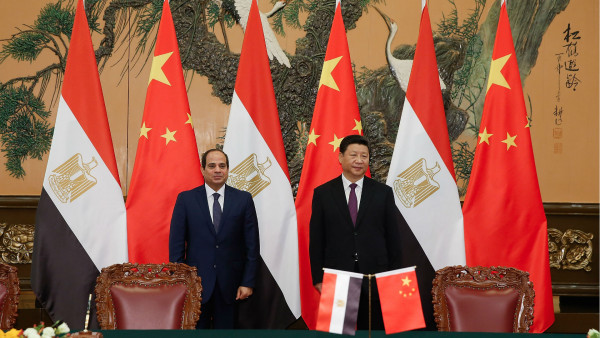Egypt’s President Abdul Fattah al-Sisi was among the Arab leaders in attendance [Getty]
Arab leaders attended the China-Arab States Cooperation Forum in Beijing this week, which focused on strengthening trade and energy cooperation, as well as addressing Israel’s war on Gaza.
Bahrain’s King Hamad bin Isa Al Khalifa, Egypt’s President Abdul Fattah al-Sisi, Tunisia’s President Kais Saied, UAE President Sheikh Mohammed bin Zayed Al Nahyan and Arab League Secretary-General Ahmed Aboul Gheit were among those attending.
President Xi Jinping is set to deliver a keynote speech at the opening ceremony on Thursday aimed at building a “common consensus” between China and Arab states.
Beijing has sought to build closer ties with Arab states in recent years, and last year brokered a detente between Iran and its long-time rival Saudi Arabia.
It has also historically been sympathetic to the Palestinian cause and supportive of a two-state solution to the Israeli-Palestinian conflict.
And Beijing last month hosted rival Palestinian groups Hamas and Fatah for “in-depth and candid talks on promoting intra-Palestinian reconciliation”.
Top of the agenda will be the war between Israel and Hamas, which Xi has called for an “international peace conference” to resolve.
China sees a “strategic opportunity to boost its reputation and standing in the Arab world” by framing its efforts to end that conflict against US inaction, Ahmed Aboudouh, an associate fellow with the Chatham House Middle East and North Africa Programme, told AFP.
“This, in turn, serves Beijing’s focus on undermining the US’s credibility and influence in the region,” he said.
“The longer the war, the easier for China to pursue this objective,” he added.
On Tuesday, Foreign Minister Wang Yi met with counterparts from Yemen and Sudan in Beijing, saying he hoped to “strengthen solidarity and coordination” with the Arab world.
He also raised China’s concerns over disruptive attacks on Red Sea shipping by Iran-backed Houthi forces acting in solidarity with Hamas with his Yemeni counterpart Shayea Mohsen al-Zindani.
“China calls for an end to the harassment of civilian vessels and to ensure the safety of waterways in the Red Sea,” state news agency Xinhua quoted him as saying.
In recent years, economic relations between China and the Arab world have notably strengthened, growing beyond a need for Gulf oil as various trade sectors have witnessed cooperation and investment pledges from both sides.
However, China’s ongoing persecution of its Uyghur Muslim minority, which has seen hundreds of thousands of people detained, tortured, and abused on account of their ethnic and religious background has negatively affected its image in the Arab world, but most Arab governments have stayed silent on this.
Recently China’s interest in having a voice in mediation efforts in the Gaza war has also been apparent, illustrated most recently by a meeting in Beijing between Fatah and Hamas in late April aimed at reconciliation between the two rival Palestinian factions after years of discord.
Agencies contributed to this report.

